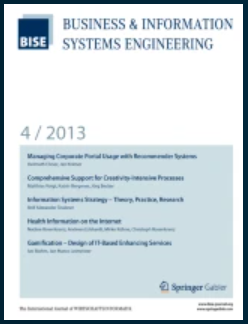探索自主身份对智能服务系统的潜在影响——以电动汽车充电服务为例
IF 7.4
3区 管理学
Q1 COMPUTER SCIENCE, INFORMATION SYSTEMS
引用次数: 3
摘要
自我主权身份(SSI)是一种新的范式,它使用户重新控制自己的数字身份。这不仅加强了用户的地位,而且意味着可以改进互操作性和可用性的新交互方案。智能服务系统实现资源和活动的整合,并以智能产品作为边界对象。由于此类系统通常涉及多个参与者之间的数字交互,因此可以假设使用SSI对他们具有积极影响。为了研究这些潜在的改进是如何体现出来的,我们以智能服务系统为例研究了电动汽车充电。我们概念分析的核心是从参考模型中提取的服务流程。基于SWOT分析,我们确定了需要转型的领域,并为电动汽车充电服务导出了一个支持ssi的交互模型。对新流程的评估表明,SSI可以降低与合作伙伴集成的复杂性,并通过简化注册和认证提供更好的客户体验。此外,SSI甚至可能导致服务系统中参与者的非中介化。尽管SSI仍在兴起,但我们的研究结果强调了它作为一种机制的相关性,通过无缝和标准化地集成人、组织和事物的数字身份,在智能服务系统中建立信任。本文章由计算机程序翻译,如有差异,请以英文原文为准。
Exploring Potential Impacts of Self-Sovereign Identity on Smart Service Systems An Analysis of Electric Vehicle Charging Services
Self-sovereign identity (SSI) is a new paradigm, which puts users back in control of their own digital identity. This does not only strengthen the position of the users but implies new interaction schemes that may improve interoperability and usability. Smart services systems enable the integration of resources and activities and use smart products as boundary objects. As such systems typically involve digital interactions between multiple actors, it can be assumed that utilising SSI has a positive impact on them. To investigate how these potential improvements manifest themselves, we investigate electric vehicle charging as example of a smart service system. At the core of our conceptual analysis is the service process, which we extract from a reference model. Based on a SWOT analysis, we identify areas for transformation and derive an SSI-enabled interaction model for an electric vehicle charging service. The evaluation of the new process shows that SSI can reduce complexity of integration with partners and can provide a better customer experience through simplified registration and authentication. Moreover, SSI might even lead to the disintermediation of actors in the service system. Although SSI is still emerging, our findings underline its relevance as a mechanism to establish trust in smart service systems through the seamless and standardised integration of digital identities for humans, organisations, and things.
求助全文
通过发布文献求助,成功后即可免费获取论文全文。
去求助
来源期刊

Business & Information Systems Engineering
Computer Science-Information Systems
CiteScore
13.60
自引率
7.60%
发文量
44
审稿时长
3 months
期刊介绍:
Business & Information Systems Engineering (BISE) is a double-blind peer-reviewed journal with a primary focus on the design and utilization of information systems for social welfare. The journal aims to contribute to the understanding and advancement of information systems in ways that benefit societal well-being.
 求助内容:
求助内容: 应助结果提醒方式:
应助结果提醒方式:


